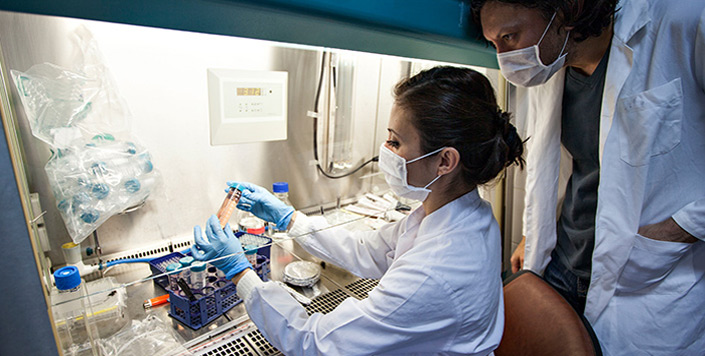
School of Medicine Publications and Presentations
Document Type
Article
Publication Date
3-2024
Abstract
Objective: Screening is an effective tool for detecting colorectal lesions in asymptomatic subjects. There is a positive correlation between fecal immunochemical test (FIT) values and the size of tumors. Despite the efficacy of screening, the detection of colorectal cancer (CRC) remains low. The primary objective was to evaluate the best FIT cutoff value for detecting advanced adenomas and CRC among individuals at average risk in a country with a high incidence and morbidity from CRC.
Methods: This observational and prospective study analyzed consecutive cases in 1461 asymptomatic subjects with a positive FIT (≥ 100 ng hemoglobin [Hb]/ mL) referred for colonoscopy (2012-2015) at a tertiary center in Uruguay.
Results: Colorectal lesions were detected in 35.3% (516/1461) of cases, with a mean age of 62.8 ± 8.3 years. About 53.2% were men and 65.1% of the tumors were located in the left side of the colon. The size of the lesion and FIT values (p = 0.001) were positively correlated. Laterally spreading tumors predominated in the right colon (586 ng Hb/mL; 95% Confidence interval [CI] 443.4-760). One hundred and thirty-five (26%) lesions were advanced adenomas (15 ± 6.7 mm); 694.6 ng/mL; 95% CI 632.4-756.9). The highest diagnostic yield (0.5112) for advanced adenomas was at a FIT level of 400 ng Hb/mL (accuracy 88.6%). There were significant differences in FIT values early and advanced CRC (927 ng/mL; [95% CI: 637-1082] vs. 1453 [95% CI: 1352-1594; p = 0.001]).
Conclusion: A FIT value of 400 ng Hb/mL was the best diagnostic yield to detect advanced adenomas and CRC. This value is useful during the COVID-19 pandemic as it allows prioritization of colonoscopy to those most at risk of significant disease, thus reducing risks to both patients and healthcare workers.
-
Objetivo: El cribado es una herramienta eficaz para detectar lesiones colorrectales en sujetos asintomáticos. Existe una correlación positiva entre los valores de la prueba inmunoquímica fecal (FIT) y el tamaño de los tumores. A pesar de la eficacia del cribado, la detección del cáncer colorrectal (CCR) sigue siendo baja. El objetivo principal fue evaluar el mejor valor de corte FIT para detectar adenomas avanzados y CCR entre personas con riesgo promedio en un país con alta incidencia y morbilidad por CCR.
Métodos: Este estudio observacional y prospectivo analizó 1461 sujetos asintomáticos con FIT positivo (≥ 100 ng de hemoglobina [Hb]/mL) remitidos para colonoscopia (2012-2015) en un centro terciario en Uruguay.
Resultados: Se detectaron lesiones colorrectales en el 35,3% (516/1461) de los casos, con una edad media de 62,8 ± 8,3 años. Alrededor del 53,2%eran hombres y el 65,1% de los tumores estaban ubicados en el lado izquierdo del colon. El tamaño de la lesión y los valores FIT (p = 0,001) se correlacionaron positivamente. Los tumores con extensión lateral predominaron en el colon derecho (586 ng Hb/mL; intervalo de confianza [IC] del 95%: 443,4-760). Ciento treinta y cinco (26%) lesiones fueron adenomas avanzados (15 ± 6,7 mm); 694,6 ng/ml; IC 95% 632,4-756,9). El rendimiento diagnóstico más alto (0,5112) para los adenomas avanzados se obtuvo con un nivel FIT de 400 ng Hb/ml (precisión del 88,6%). Hubo diferencias significativas en los valores de FIT de CCR temprano y avanzado (927 ng/mL; [IC 95%: 637-1082] vs. 1453 [IC 95%: 1352-1594; p = 0,001]).
Conclusión: Un valor FIT de 400 ng Hb/mL fue el mejor rendimiento diagnóstico para detectar adenomas avanzados y CCR. Este valor es útil durante la pandemia de COVID-19, ya que permite priorizar la colonoscopia a aquellos con mayor riesgo de padecer una enfermedad importante, reduciendo así los riesgos tanto para los pacientes como para los trabajadores de la salud.
Recommended Citation
Gaggero, P., Fenocchi, E., Silva, C., López-Alvarenga, J. C., Lambert, N., Batista, F., Sobrino-Cossío, S., White, J. R., & Parra-Blanco, A. (2024). Identifying the best cutoff value of the fecal occult blood immunochemical test in the detection of advanced and neoplastic colorectal lesions. Cirugia y cirujanos. Advance online publication. https://doi.org/10.24875/CIRU.23000651
Creative Commons License

This work is licensed under a Creative Commons Attribution-NonCommercial-No Derivative Works 4.0 International License.
Publication Title
Cirugia Y Cirujanos
DOI
10.24875/CIRU.23000651
Academic Level
faculty
Mentor/PI Department
Population Health and Biostatistics


Comments
© 2022 Academia Mexicana de Cirugía.
This is an open access article under the terms of the CC BY-NC-ND license (http://creativecommons.org/licenses/by-nc-nd/4.0/).